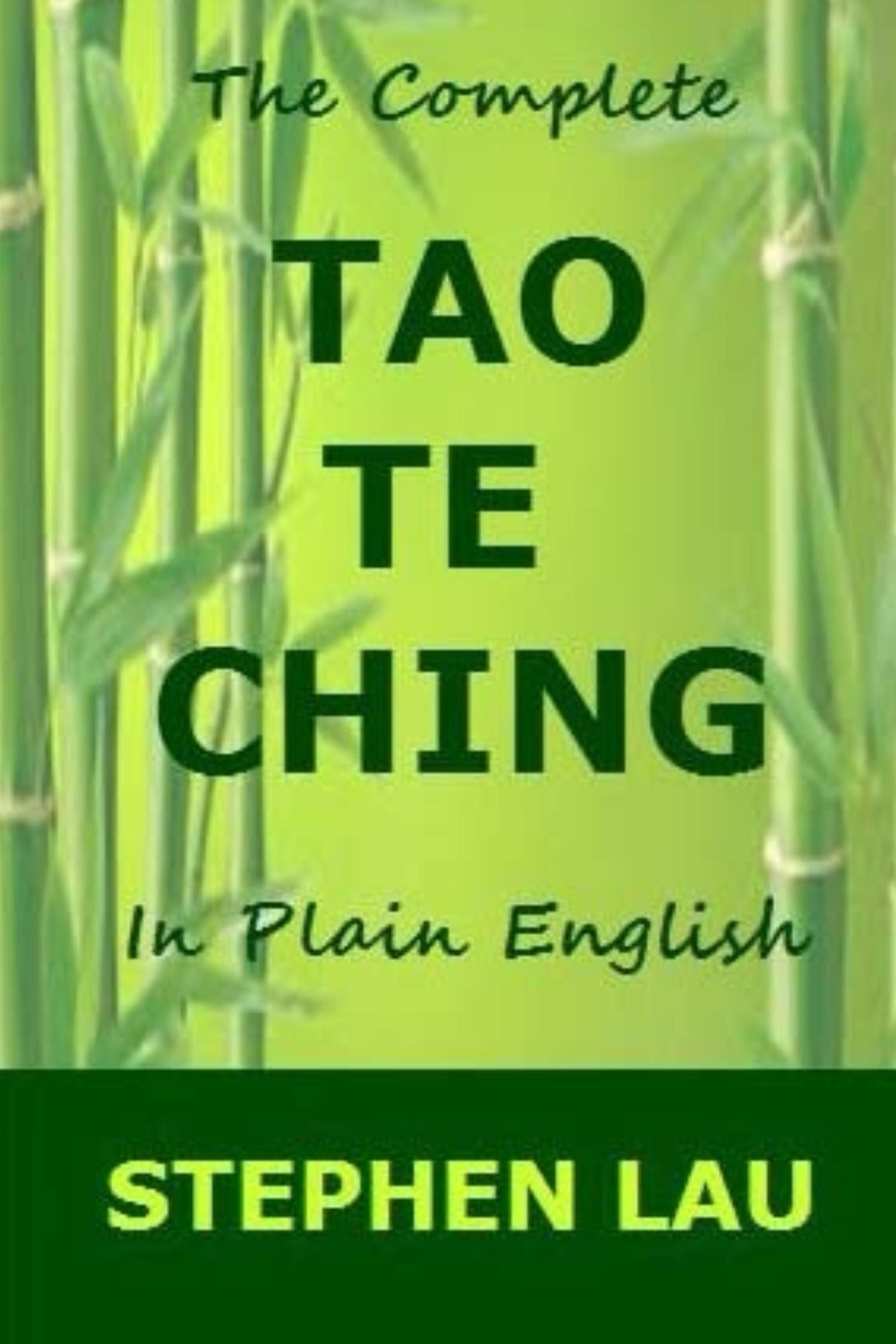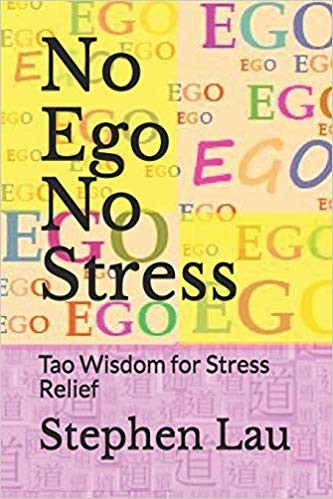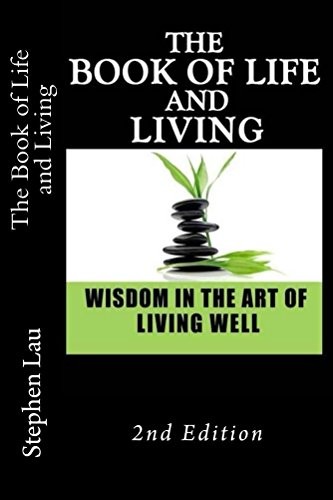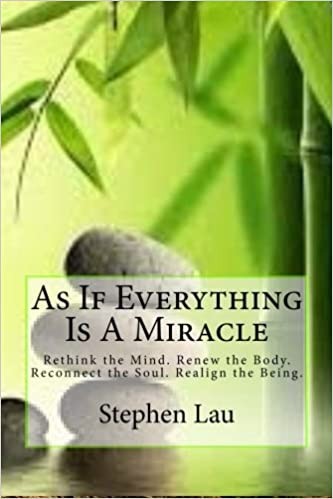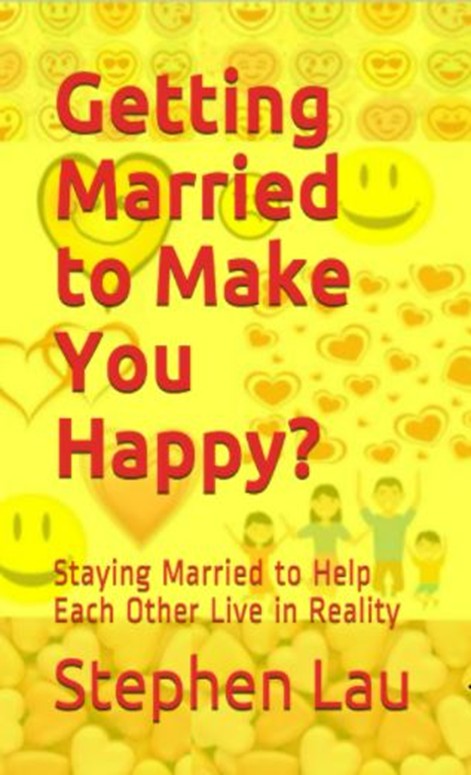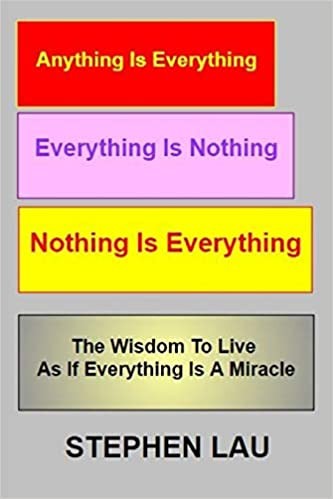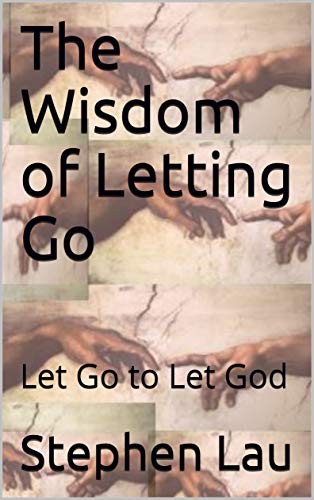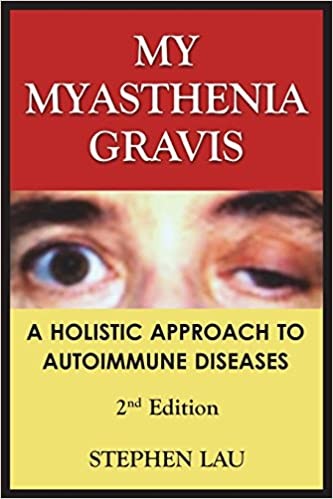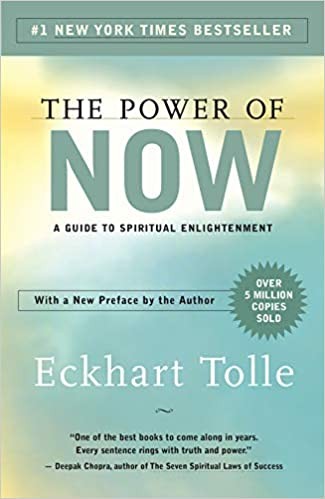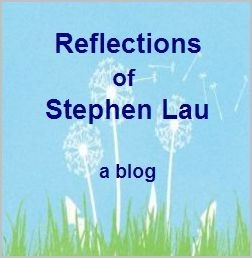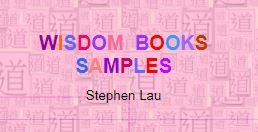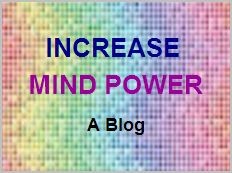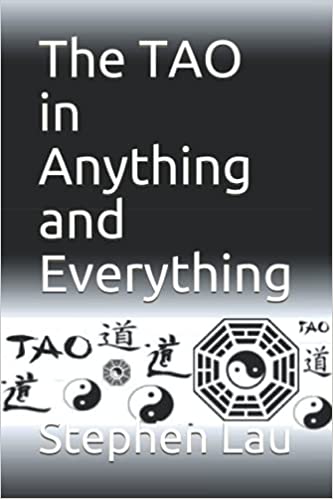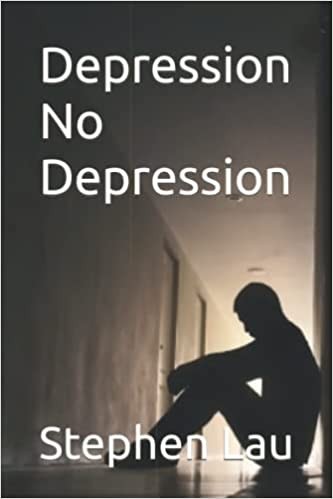NO EGO NO STRESS
by Stephen Lau
The human ego is the underlying source of all stressors in contemporary living -- a stumbling block to wisdom in living..
Learn and understand the ancient human wisdom from China to eliminate all stress in everyday living.
To find out more, click click here.
by Stephen Lau
The human ego is the underlying source of all stressors in contemporary living -- a stumbling block to wisdom in living..
Learn and understand the ancient human wisdom from China to eliminate all stress in everyday living.
To find out more, click click here.
Twitter Updates Follow Stephen Lau on TWITTER
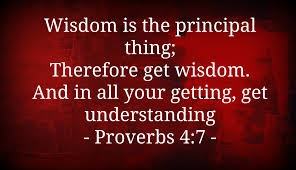
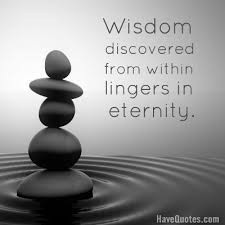
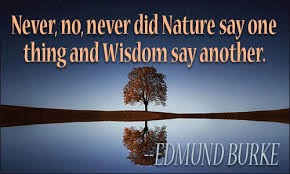
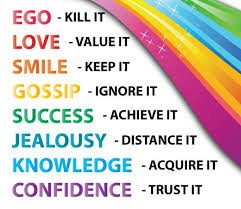


Wisdom in Living
Stephen Lau
Stephen Lau
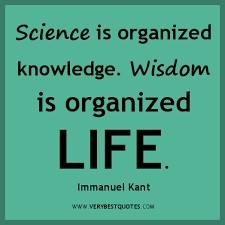






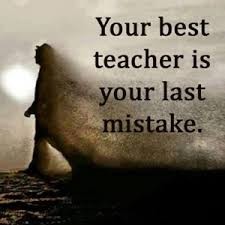
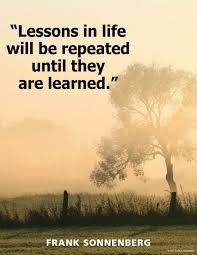


Wisdom
Is
Knowing and Understanding
Is
Knowing and Understanding
Wisdom has much to do with the thinking mind, rather than the acquisition of knowledge. So, being knowledgeable does not make you or wiser.
Albert Einstein once said: "Thinking is difficult, and that is why few people do it."
So, what is thinking? Thinking is your self-consciousness of what is happening in your mind. Many people simply act or react to what their mind tells them to do -- that is just a subconscious response to what their mind says. Thinking is asking the mind many self-intuitive questions about all the hows, the whats, and the whys in any given situation throughout life.
Albert Einstein once said: "Thinking is difficult, and that is why few people do it."
So, what is thinking? Thinking is your self-consciousness of what is happening in your mind. Many people simply act or react to what their mind tells them to do -- that is just a subconscious response to what their mind says. Thinking is asking the mind many self-intuitive questions about all the hows, the whats, and the whys in any given situation throughout life.
Living in Wisdom
Thinking is wisdom. But many do not think because they have a pre-conditioned mind, which is controlled by our subconscious mind. To think out of the box, you must have an empty mind in order to change your pre-conditioned thinking.
The human brain is like a computer program. Your whole being is like the computer hardware with the apparatus of a mind, body, and senses. The lens through which you see yourself, as well as others and the world around, is the software that has been programmed by your thoughts, your past and present experiences, your own expectations as well as those of others. That is to say, you may have subconsciously programmed your mind all these years with your memories, perceptions, and thoughts, such that you may have become trapped in a constricted sense of self that has prevented you from knowing and being who you really are.
Begin your own thinking by asking questions and seeking answers so that you may now have an empty mindset.
Biblical Wisdom
Understanding Biblical wisdom requires profound human wisdom. Reading the Bible may not lead you anywhere unless you have an open mind, or the "reverse" mindset of Lao Tzu, the author of Tao Te Ching, the ancient immortal classic from China.
Interestingly enough, both Tao Te Ching and the Bible are among the most translated and extensively read books in world literature. Tao Te Ching is about human wisdom, and the Bible is about the wisdom of God. The former was written hundreds of years before the birth of Jesus Christ. Because both books are about wisdom and true wisdom is universal and timeless, often sharing some common attributes, there are similarities in the Biblical truths expressed in the Bible and the profound and eternal truths of human wisdom in Tao Te Ching.
Stephen Lau
Copyright© by Stephen Lau
The TAO in Everyday Life: The TAO can help every aspect of your life: growing up; seeking education; finding a careers; making money; maintaining good relationships; getting married; raising children; staying healthy and healed; confronting aging and dying. Click here to find out how the TAO can help you.
Thinking is wisdom. But many do not think because they have a pre-conditioned mind, which is controlled by our subconscious mind. To think out of the box, you must have an empty mind in order to change your pre-conditioned thinking.
The human brain is like a computer program. Your whole being is like the computer hardware with the apparatus of a mind, body, and senses. The lens through which you see yourself, as well as others and the world around, is the software that has been programmed by your thoughts, your past and present experiences, your own expectations as well as those of others. That is to say, you may have subconsciously programmed your mind all these years with your memories, perceptions, and thoughts, such that you may have become trapped in a constricted sense of self that has prevented you from knowing and being who you really are.
Begin your own thinking by asking questions and seeking answers so that you may now have an empty mindset.
Biblical Wisdom
Understanding Biblical wisdom requires profound human wisdom. Reading the Bible may not lead you anywhere unless you have an open mind, or the "reverse" mindset of Lao Tzu, the author of Tao Te Ching, the ancient immortal classic from China.
Interestingly enough, both Tao Te Ching and the Bible are among the most translated and extensively read books in world literature. Tao Te Ching is about human wisdom, and the Bible is about the wisdom of God. The former was written hundreds of years before the birth of Jesus Christ. Because both books are about wisdom and true wisdom is universal and timeless, often sharing some common attributes, there are similarities in the Biblical truths expressed in the Bible and the profound and eternal truths of human wisdom in Tao Te Ching.
Stephen Lau
Copyright© by Stephen Lau
The TAO in Everyday Life: The TAO can help every aspect of your life: growing up; seeking education; finding a careers; making money; maintaining good relationships; getting married; raising children; staying healthy and healed; confronting aging and dying. Click here to find out how the TAO can help you.
TAO is the Way to understanding Biblical wisdom, which is not only inexplicable but also paradoxical. You have to believe in order to overcome your unbelief. So, human wisdom is the Way to spiritual wisdom.
TAO is the wisdom of Lau Tzu, the ancient sage from China. TAO comes from "Tao Te Ching" -- one of the most translated books in world literature due to its profound and controversial wisdom.
Understanding
Is
Consciousness of Self
Is
Consciousness of Self
Consciousness of self is understanding who you really are, and not who you wish you were. The opposite is awareness of being who you wish you were, that is, your ego-self. The former is humility, while the latter is pride.
Focusing on your ego-self gives you only self-delusions, instead of clarity of thinking. You see only yourself, and no one else, and everything has to be your way or no way.
With humility, you see everything as it really is -- no more and no less. Humility, and not pride in the ego-self, is the pathway to clarity of thinking.
Focusing on your ego-self gives you only self-delusions, instead of clarity of thinking. You see only yourself, and no one else, and everything has to be your way or no way.
With humility, you see everything as it really is -- no more and no less. Humility, and not pride in the ego-self, is the pathway to clarity of thinking.
Depression is common because people want everything their way or no way -- and this is the way to depression! Medication is not the way out of depression; the only way out is letting go of "my way or no way."
Stress comes from the ego-self, which demands attachments in life to define and sustain the ego. All stressors in life contribute to imbalance and disharmony. So, with humility, let go of all attachments to live a no-stress life.
Living in Understanding
Resolving Paradoxes
A paradox is a statement with two totally opposite meanings that may seem contradictory to each other and yet together they not only are true but also make sense. Your ego-self is assertive, and even aggressive, always telling you that you are separate from everyone else.
Your ego-self wants more of everything, not only to define who you are but also to separate you from others. Your ego-self is judgmental, not only self-evaluating but also assessing others through comparison and contrast with yourself. Your ego-self is constantly shifting and shuffling back and forth between the past and the future, instrumental in improving the ego-self in the past, as well as in enhancing the ego-self expected in the future.
Your spirit is the other person living inside you. Your spirit, on the other hand, is gentle and submissive in nature, always nudging you to do what is right and to avoid doing what is wrong.
The paradox of two-in-one
The paradox is that both your ego-self and your spirit co-exist, and that each strives to dominate and influence the other.
The classic illustration of the two-in-one person is Robert Louis Stevenson’s famous story of Dr. Jekyll and Mr. Hyde. In the story, both Dr. Jekyll and Mr. Hyde have a dark side within them, where evil is always lurking underneath to surface anytime. In the end, it turns out that Dr. Jekyll and Mr. Hyde are actually one and the same person.
Given that the ego-self and the spirit co-exist and that one can never totally get rid of the other, the reality is that the more control the ego-self has over the spirit, the more difficult it is to understand God’s presence, not to mention to attain His wisdom and guidance. To unravel the paradox of two-in-one person, let go of the ego-self, or at least diminish its control over the spirit, so as to feel more the presence of God in order to understand more His wisdom.
The paradox of understanding God
One of the reasons for the paradox of God’s presence is rationalization. Man is a rational being, and understanding is vital to believing -- without understanding, it is difficult to believe.
According to St. Augustine, the Bishop of Hippo (354-430 A.D.), in life there are certain things we do not believe unless we understand them, and there are also other things that we do not understand unless we believe them first. According to St. Augustine, faith is not opposed to understanding, nor is it independent of understanding. His famous statement “Faith seeking understanding” is an act of believing first, without which unbelief closes the door to further understanding. In other words, believe first, and understanding will follow. St. Anselm of Canterbury, a well-known Christian philosopher and theologian of the eleventh century, also echoed St. Augustine’s statement in his famous motto: “I do not seek to understand in order that I may believe, but I believe in order to understand.”
“By faith we understand that the worlds were framed by the word of God, so that the things which are seen were not made of things which are visible.”
(Hebrews 11:3)
The reality is that man has only limited power of understanding. Therefore, let go of any pre-conceived concept or rationalization in order to appreciate the presence of God, which demands humility -- a deflated ego-self.
Stephen Lau
Copyright© by Stephen Lau
Today many do not live in reality because they continue to commit the Seven Deadly Sins mentioned thousands of years ago. TAO explains how you can avoid and overcome those sins. Not living in reality is self-delusional and self-destructive.
You cannot live without money, and money makes your world go round. But money is the No. 1 cause of divorce, and the source of all human evils and sins. So, get your money wisdom to survive and thrive.
Self-Acceptance Is Everything
Living in reality is accepting and embracing life as it is, and still living as if everything is a miracle.
But the reality is that many are not living in reality -- they have become self-delusional, and even self-destructive.
Not living in reality originates from the ego-self that makes all the choices and takes all the actions in life that create the illusive and delusive realities in the mind of an individual.
But the reality is that many are not living in reality -- they have become self-delusional, and even self-destructive.
Not living in reality originates from the ego-self that makes all the choices and takes all the actions in life that create the illusive and delusive realities in the mind of an individual.
Living in Reality
Humility
Anyone with an inflated ego has already committed the First Deadly Sin of Pride -- a precursor to committing other sins, including envy and greed. But with humility, the enemy of pride, an individual may get the blessing from God in the form of divine guidance to overcome many of the Seven Deadly Sins to survive and thrive in this world. That is living in reality.l about.
Money Wisdom
In the past, people could enjoy the blessings of life without spending any real money. Nowadays, to many people, enjoyment of life requires money—and lots of it!
According to Buddha, craving or desire for material things is the source of all human miseries. Jesus also has this to say about money: “It is easier for a camel to pass through the eye of a needle than for a rich man to go to heaven.” (Luke 18:25)
So, what is the value of money? According to author Jonathan Swift, a wise man should have money in his head, but not in his heart.
More importantly, what does money mean to you?
Your perceptions of the value of money determine two of the most important things in your life: how you are going to live your life; how you are going to spend your money.
The value of money is based on your core values in life. One of the core values in life is integrity. Life, at any phase, is all about living—it comes with some hard work and simple integrity. Integrity is an important personal value, which has little to do with money. Integrity is an important value that the Creator has bestowed on each and every one of us, and its availability is the choice of an individual. Essentially, integrity is the value of what life has to offer, not the value of things that can be purchased with money. Your core values affect your attitudes toward money, including your financial priorities, financial decisions, and money management. So, what is the value of money to you?
Once you know the real value of money to you, you will know what to do with your money, and you will find the money you need.
Spending money is also an extremely important issue in life: throughout history, countries have become bankrupt, empires have collapsed, and families have broken up because of spending much too much money. So, spending money can affect positively or negatively your life, and can be a major stress factor.
Spending money has little to do with whether you have or you do not have much money. Spending money has to do with your attitude toward money. It has everything to do with the practical as well as the spiritual aspects of money and finance.
The practical aspect of spending money is that it may lead to debt—which is the source of financial stress.
Why do people go into debt?
People go into debt for various reasons: deficit spending, a result of buying things they don’t need with the money they don’t have; unforeseeable circumstances, due to exorbitant medical bills or loss of employment; personal choice, a consequence of reckless spending or buying on credit, bad investments, wrong financial decisions; ignorance, such as not knowing the meaning of APR or the implications of “minimum payments” on credit cards, lack of knowledge of finance and money management; greed, leading to taking financial risks, or trying to get something for nothing. The list could go and on.
Don’t ever fall into the trap of “buy-now-and-pay-later”! Don’t run up your credit card debt. Consumer debt is the No.1 financial stress factor in life. Don’t let debt devastate your life. Don’t use a credit card if you don’t have control over spending; instead, use a debit card or a pre-paid credit card for the convenience of not carrying cash. Be careful when you use credit-card counseling services to get you out of debt, especially those so-called “non-profit” organizations. Just beware!
The spiritual aspects of spending money include being grateful and generous, as well as being a good steward.
Be grateful. God may have given you much less than others—or so you think! Remember, everything is relative. Maybe less is more: God has given you less so that you will have the incentive to make more.
You may have worked hard, but with little to show for it. “You plant much but harvest little. You have scarcely enough to eat or drink and not enough to keep you warm. Your income disappears, as though you were putting it into pockets filled with holes.” (Haggai 1:6) Be grateful, instead of whining and complaining; put your time and effort on making money to live a debt-free life. More importantly, be generous with your money.
According to the biblical principle of money, God owns it all! You are but a steward of God’s money. Responsibilities of good stewardship include diligence, productivity, good time management, and self-discipline in matters of money. The money is not yours anyway. That is why you cannot take it with you when you are gone for good.
Stephen Lau
Copyright© by Stephen Lau
Humility
Anyone with an inflated ego has already committed the First Deadly Sin of Pride -- a precursor to committing other sins, including envy and greed. But with humility, the enemy of pride, an individual may get the blessing from God in the form of divine guidance to overcome many of the Seven Deadly Sins to survive and thrive in this world. That is living in reality.l about.
Money Wisdom
In the past, people could enjoy the blessings of life without spending any real money. Nowadays, to many people, enjoyment of life requires money—and lots of it!
According to Buddha, craving or desire for material things is the source of all human miseries. Jesus also has this to say about money: “It is easier for a camel to pass through the eye of a needle than for a rich man to go to heaven.” (Luke 18:25)
So, what is the value of money? According to author Jonathan Swift, a wise man should have money in his head, but not in his heart.
More importantly, what does money mean to you?
Your perceptions of the value of money determine two of the most important things in your life: how you are going to live your life; how you are going to spend your money.
The value of money is based on your core values in life. One of the core values in life is integrity. Life, at any phase, is all about living—it comes with some hard work and simple integrity. Integrity is an important personal value, which has little to do with money. Integrity is an important value that the Creator has bestowed on each and every one of us, and its availability is the choice of an individual. Essentially, integrity is the value of what life has to offer, not the value of things that can be purchased with money. Your core values affect your attitudes toward money, including your financial priorities, financial decisions, and money management. So, what is the value of money to you?
Once you know the real value of money to you, you will know what to do with your money, and you will find the money you need.
Spending money is also an extremely important issue in life: throughout history, countries have become bankrupt, empires have collapsed, and families have broken up because of spending much too much money. So, spending money can affect positively or negatively your life, and can be a major stress factor.
Spending money has little to do with whether you have or you do not have much money. Spending money has to do with your attitude toward money. It has everything to do with the practical as well as the spiritual aspects of money and finance.
The practical aspect of spending money is that it may lead to debt—which is the source of financial stress.
Why do people go into debt?
People go into debt for various reasons: deficit spending, a result of buying things they don’t need with the money they don’t have; unforeseeable circumstances, due to exorbitant medical bills or loss of employment; personal choice, a consequence of reckless spending or buying on credit, bad investments, wrong financial decisions; ignorance, such as not knowing the meaning of APR or the implications of “minimum payments” on credit cards, lack of knowledge of finance and money management; greed, leading to taking financial risks, or trying to get something for nothing. The list could go and on.
Don’t ever fall into the trap of “buy-now-and-pay-later”! Don’t run up your credit card debt. Consumer debt is the No.1 financial stress factor in life. Don’t let debt devastate your life. Don’t use a credit card if you don’t have control over spending; instead, use a debit card or a pre-paid credit card for the convenience of not carrying cash. Be careful when you use credit-card counseling services to get you out of debt, especially those so-called “non-profit” organizations. Just beware!
The spiritual aspects of spending money include being grateful and generous, as well as being a good steward.
Be grateful. God may have given you much less than others—or so you think! Remember, everything is relative. Maybe less is more: God has given you less so that you will have the incentive to make more.
You may have worked hard, but with little to show for it. “You plant much but harvest little. You have scarcely enough to eat or drink and not enough to keep you warm. Your income disappears, as though you were putting it into pockets filled with holes.” (Haggai 1:6) Be grateful, instead of whining and complaining; put your time and effort on making money to live a debt-free life. More importantly, be generous with your money.
According to the biblical principle of money, God owns it all! You are but a steward of God’s money. Responsibilities of good stewardship include diligence, productivity, good time management, and self-discipline in matters of money. The money is not yours anyway. That is why you cannot take it with you when you are gone for good.
Stephen Lau
Copyright© by Stephen Lau
Free yourself from your self-delusions created by your self-consciousness of who and what you think you are. With the integration of both conventional and ancient wisdom, you may begin to live your life very differently. Click here.
Life Has a Meaning
and
Living Has a Purpose
and
Living Has a Purpose
Living for life is living with a life purpose, as well as a life passion for what you love to do.
With humility and divine inspiration, you may see that you were created for a specific purpose with a personal role to play in the world you are living in. While growing up, you may also develop your interest in doing something you love to do, such as artwork, music, and sports, among many others.
With humility, you may see your inter-connection with others around you. This perception may define your life purpose and life passion.
With humility and divine inspiration, you may see that you were created for a specific purpose with a personal role to play in the world you are living in. While growing up, you may also develop your interest in doing something you love to do, such as artwork, music, and sports, among many others.
With humility, you may see your inter-connection with others around you. This perception may define your life purpose and life passion.
Living for Life
Living for life is living for a purpose Life must have a purpose, or, more specifically, an external as well as an internal purpose. Life without a purpose is meaningless.
External Purpose
In life setting, a purpose is important, but not so important that it drives you crazy in pursuing it or giving it up altogether. As a matter of fact, there is an external purpose that only sets you a direction for the destination of your life. In that direction, there are many different signposts guiding you along the way. Arriving at one signpost simply means that you have accomplished one task; missing that signpost means that you are still on the right path but simply taking maybe a detour or just longer time because of mis-direction or getting lost on the way.
Internal Purpose
Your internal purpose is more important: it has nothing to do with arriving at your destination, but to do with the quality of your consciousness—what you are doing along the way.
That Jesus said: “gain the world and lose your soul” probably said everything there is to say about the internal purpose of life for an individual.
External purpose can never give lasting fulfillment in life due to its transience and impermanence, but internal purpose, because of its unique quality of being in the present moment, may give us inner joy and a sense of fulfillment. That is how you should feel about your internal life purpose.
No matter what you do in your life, just do your very best and do it well, no matter how insignificant they may be.
“If a man is called to be a street sweeper, he should sweep streets even as Michelangelo painted, or Beethoven composed music, or Shakespeare wrote poetry. He should sweep streets so well that all the host of heaven and earth will pause to say, ‘Here lived a great street sweeper who did his job well.’” Martin Luther King Jr.
Always tell yourself to try doing everything as if God had called upon you at that particular moment to do it. Of course, admittedly, it is not always that easy, given that the mind may be troubled by the ego-self, by invasive and unwanted thoughts from the past or by projections of those thoughts into the future. But having the mindset with the right intention is already a first step or breakthrough for you.
Always understand that you have three options in whatever you have been called to do: do it; not to do it; and do it while enjoying the present moment of doing. So, just do what you have to do, whether you like it or not, just as Michelangelo painted—who, believing that his talent was in sculpture and not in painting, was at first unwilling to do the fresco, which turned out to be one of his greatest masterpieces.
The bottom line: Do what you may not like to do, and learn to like what you have to do.
Sometimes you may like to ask this question: “What about tomorrow?”
Well, you cannot speak for tomorrow. Tomorrow hasn’t come yet. After all, tomorrow is another day, just as Scarlet O’Hara said in Gone with the Wind.
Stephen Lau
Copyright© by Stephen Lau
Living for life is living for a purpose Life must have a purpose, or, more specifically, an external as well as an internal purpose. Life without a purpose is meaningless.
External Purpose
In life setting, a purpose is important, but not so important that it drives you crazy in pursuing it or giving it up altogether. As a matter of fact, there is an external purpose that only sets you a direction for the destination of your life. In that direction, there are many different signposts guiding you along the way. Arriving at one signpost simply means that you have accomplished one task; missing that signpost means that you are still on the right path but simply taking maybe a detour or just longer time because of mis-direction or getting lost on the way.
Internal Purpose
Your internal purpose is more important: it has nothing to do with arriving at your destination, but to do with the quality of your consciousness—what you are doing along the way.
That Jesus said: “gain the world and lose your soul” probably said everything there is to say about the internal purpose of life for an individual.
External purpose can never give lasting fulfillment in life due to its transience and impermanence, but internal purpose, because of its unique quality of being in the present moment, may give us inner joy and a sense of fulfillment. That is how you should feel about your internal life purpose.
No matter what you do in your life, just do your very best and do it well, no matter how insignificant they may be.
“If a man is called to be a street sweeper, he should sweep streets even as Michelangelo painted, or Beethoven composed music, or Shakespeare wrote poetry. He should sweep streets so well that all the host of heaven and earth will pause to say, ‘Here lived a great street sweeper who did his job well.’” Martin Luther King Jr.
Always tell yourself to try doing everything as if God had called upon you at that particular moment to do it. Of course, admittedly, it is not always that easy, given that the mind may be troubled by the ego-self, by invasive and unwanted thoughts from the past or by projections of those thoughts into the future. But having the mindset with the right intention is already a first step or breakthrough for you.
Always understand that you have three options in whatever you have been called to do: do it; not to do it; and do it while enjoying the present moment of doing. So, just do what you have to do, whether you like it or not, just as Michelangelo painted—who, believing that his talent was in sculpture and not in painting, was at first unwilling to do the fresco, which turned out to be one of his greatest masterpieces.
The bottom line: Do what you may not like to do, and learn to like what you have to do.
Sometimes you may like to ask this question: “What about tomorrow?”
Well, you cannot speak for tomorrow. Tomorrow hasn’t come yet. After all, tomorrow is another day, just as Scarlet O’Hara said in Gone with the Wind.
Stephen Lau
Copyright© by Stephen Lau
Living as if everything is a miracle requires the reconnection of your body, mind, and soul for internal and external balance and harmony.
Seeking Happiness Is Chasing the Wind
Happiness is invisible -- just like the wind. It is only a feeling and a perception of the mind.
Having a successful career, getting happily married, winning the lottery -- they are just like the wind that comes and goes. Happiness is unforeseeable, unpredictable, and unattainable -- just like chasing the wind.
Having a successful career, getting happily married, winning the lottery -- they are just like the wind that comes and goes. Happiness is unforeseeable, unpredictable, and unattainable -- just like chasing the wind.
Living With No Expectation
Happiness is "an expectation fulfilled." Happiness is pleasure and satisfaction perceived by the mind through the five senses. Subconsciously, it becomes an expectation that needs to be fulfilled. The thinking mind is forever looking into the past for those past experiences of pleasure and satisfaction, and then project them into the present as well as into the future as expectations to be repeated and fulfilled. Any expectation unfulfilled then becomes unhappiness.
All your life experiences with their own respective messages—the pleasant and the unpleasant; the positive and the negative—are all stored at the back of your subconscious mind in the form of your assumptions, attitudes, causal concepts, and memories.
Accumulated over the years, those experiences and messages have become the raw materials with which you subconsciously weave the fabrics of your life, making you who and what you have now become, with your own expectations that have also become your “realities."
“Blessed is he who expects nothing, for he shall never be disappointed.” Alexander Pope
In life, many expect certain things to happen, and they become greatly disappointed when things do not turn out the way they think they should. As a matter of fact, in life, things seldom go their ways, and life is never what it should be. Their disappointments can easily turn into anger, anxiety, despair, regret, and many other negative emotions that adversely affect who they are and how they process their thoughts.
To offset or diminish the devastating emotional consequences as a result of not meeting their expectations, many may resort to mentally expecting the worst, instead of the best. That is, they may deliberately lower their life expectations to proportionately reduce the extent of their disappointments -- this negative approach to life expectations may lead to depression.
Processing expectations is more complex than we may think. The mental exertion to “expect the unexpected”, to “go with the flow”, and to “live in the present without any future expectation” is easier said than done, and may be even difficult or impossible for most of us. Indeed, it is not easy to draw a line between having "great expectations" and having "negative expectations."
So, live a simple life with no expectation, and no attachment.
Stephen Lau
Copyright© by Stephen Lau
Happiness is "an expectation fulfilled." Happiness is pleasure and satisfaction perceived by the mind through the five senses. Subconsciously, it becomes an expectation that needs to be fulfilled. The thinking mind is forever looking into the past for those past experiences of pleasure and satisfaction, and then project them into the present as well as into the future as expectations to be repeated and fulfilled. Any expectation unfulfilled then becomes unhappiness.
All your life experiences with their own respective messages—the pleasant and the unpleasant; the positive and the negative—are all stored at the back of your subconscious mind in the form of your assumptions, attitudes, causal concepts, and memories.
Accumulated over the years, those experiences and messages have become the raw materials with which you subconsciously weave the fabrics of your life, making you who and what you have now become, with your own expectations that have also become your “realities."
“Blessed is he who expects nothing, for he shall never be disappointed.” Alexander Pope
In life, many expect certain things to happen, and they become greatly disappointed when things do not turn out the way they think they should. As a matter of fact, in life, things seldom go their ways, and life is never what it should be. Their disappointments can easily turn into anger, anxiety, despair, regret, and many other negative emotions that adversely affect who they are and how they process their thoughts.
To offset or diminish the devastating emotional consequences as a result of not meeting their expectations, many may resort to mentally expecting the worst, instead of the best. That is, they may deliberately lower their life expectations to proportionately reduce the extent of their disappointments -- this negative approach to life expectations may lead to depression.
Processing expectations is more complex than we may think. The mental exertion to “expect the unexpected”, to “go with the flow”, and to “live in the present without any future expectation” is easier said than done, and may be even difficult or impossible for most of us. Indeed, it is not easy to draw a line between having "great expectations" and having "negative expectations."
So, live a simple life with no expectation, and no attachment.
Stephen Lau
Copyright© by Stephen Lau
Pursuing happiness is like "a carrot- and-stick in front of a mule" -- the more you strive to reach out for it, the more evasive it is, and the more painful it may become. So, get the happiness wisdom to live your life as if everything is a miracle.
A happy marriage has to do with right-doing for a marriage couple in a two-in-one lifestyle to avoid conflicts, adultery, infidelity, and to promote sexual intimacy.
Wisdom in living is understanding the impermanence of all things: that is, nothing lasts, and everything remains only with that very present moment; what goes up must also come down; life is inevitably followed by death.
Nothing lasts. So, let go of anything and everything, both positive and negative, as well as the present and the past, to live a stress-free lifestyle in balance and harmony.
Detaching Is Letting Go
Detaching is letting go of anything and everything in life.
Why? It is because of the impermanence of all things -- that is, nothing lasts. So, why hold on to anything that is impermanent? Making what is impermanent permanent is self-delusion, and that is not wisdom in living.
Why? It is because of the impermanence of all things -- that is, nothing lasts. So, why hold on to anything that is impermanent? Making what is impermanent permanent is self-delusion, and that is not wisdom in living.
Living in Simplicity
God-Given Image and Man-Made Identity
Letting go to let God begins with believing in the mysteries and manifestations of human creation: we are all created in the image of God.
“So God created mankind in his own image,
in the image of God he created them;
male and female he created them.”
(Genesis 1: 27)
What does that really mean, and what is the wisdom in that?
You may never know why you were created in the first place, but one thing you know for sure is that not only you are different from all His other creations but also all humans are uniquely different from one another in that respect — just like the uniqueness in humans’ fingerprints. The wisdom is that you, just like everybody else, have His image, and this is indeed a blessing. That also means you have a spirit within you that not only defines who you are, but also connects you somehow and somewhat to and with Him in a uniquely individual way, because your image is a reflection of Him. In other words, we all have a unique identity of our own, which is composed of some of the attributes of the Creator.
Living in the material world, you may also have consciously and subconsciously created another image of your own — a man-made identity, or an ego-self. If you are more aware of your man-made identity, you may then become less conscious of your God-given image. Your attachments that have created your own man-made identity may then slowly and imperceptibly detach and distance yourself from your God-given image.
The bottom line: letting go of some, if not all, of your attachments to your man-made identity may enhance your God-given image within you. Do you always identify yourself with the car you drive, the neighborhood you live in, the social circles you belong to, and the career you have taken up? All these attachments in the material world may have created your own man-made identity, but not your God-given image. Just think about that.
So, let go to let God define your own identity.
Stephen Lau
Copyright© by Stephen Lau
God-Given Image and Man-Made Identity
Letting go to let God begins with believing in the mysteries and manifestations of human creation: we are all created in the image of God.
“So God created mankind in his own image,
in the image of God he created them;
male and female he created them.”
(Genesis 1: 27)
What does that really mean, and what is the wisdom in that?
You may never know why you were created in the first place, but one thing you know for sure is that not only you are different from all His other creations but also all humans are uniquely different from one another in that respect — just like the uniqueness in humans’ fingerprints. The wisdom is that you, just like everybody else, have His image, and this is indeed a blessing. That also means you have a spirit within you that not only defines who you are, but also connects you somehow and somewhat to and with Him in a uniquely individual way, because your image is a reflection of Him. In other words, we all have a unique identity of our own, which is composed of some of the attributes of the Creator.
Living in the material world, you may also have consciously and subconsciously created another image of your own — a man-made identity, or an ego-self. If you are more aware of your man-made identity, you may then become less conscious of your God-given image. Your attachments that have created your own man-made identity may then slowly and imperceptibly detach and distance yourself from your God-given image.
The bottom line: letting go of some, if not all, of your attachments to your man-made identity may enhance your God-given image within you. Do you always identify yourself with the car you drive, the neighborhood you live in, the social circles you belong to, and the career you have taken up? All these attachments in the material world may have created your own man-made identity, but not your God-given image. Just think about that.
So, let go to let God define your own identity.
Stephen Lau
Copyright© by Stephen Lau
Myasthenia Gravis is one of the many autoimmune diseases that attack a compromised immune system. According to conventional medicine, there is no known cure. But the author cured his own disorder through his own holistic approach.
"Prayers are seldom answered" means "human expectations not fulfilled." All expectations are only memories of the past projected by the thinking mind into the future as "realities." So, live in reality.
Living in Adversity
Life may be a bed of roses, but always with many thorns. Good fortunes and misfortunes exist side by side, and they complement each other. A misfortune is an ingredient that one needs to blend with the rest of the ingredients of life and living. Life will not be wholesome without misfortunes and tragedies, which exist to enable one to appreciate more what life has to offer.
“Every adversity, every failure, every heartache carries with it the seed of an equal or greater benefit.” Napoleon Hill
The wisdom is that an adversity may be a blessing in disguise. Worse, if one dwells on the adversity, one may attract more adversities.
The Law of Attraction
The Law of Attraction is about energy attraction: positive energies attracting more positive energies, and the same for negative energies. This revolutionary concept has been exponentially popularized by the film "The Secret" as well as by the bestseller book and other related publications across the Internet.
Is the Law of Attraction a myth of the mind or a reality in real life? Can the Law of Attraction really help your healing from diseases and disorders?
Say, when an individual is diagnosed with cancer, that individual often becomes obsessed with anxiety about its treatment options as well as the prognosis of the disease. Obsession with cancer may internalize it into self-doubt and even fear. If an individual is preoccupied with the thought that breast cancer runs in the family, that individual may have predominant thoughts of cancer. Even "positive" thoughts, such as "I am not going to get breast cancer like my mother, my grandmother, or my sister" will only attract negative energy into that individual's life, because the mind only sees the word "cancer" and the "cancer fear" and nothing else. Just as a person buying a lottery ticket will not be attracting energy of abundance, because the mind is focusing on the lack rather than on the abundance, and thus attracting negative and not positive energy.
Once you have decided on what you want: a clean bill of health, you proceed to changing your thoughts and feelings. This may not happen right away, it may take time and effort to shift your thoughts, language, and emotions. Develop positive affirmations and self-suggestions to help you day in and day out. Keep the end in mind, that is, the core values in your life. Live everyday of your life in alignment with what you believe in. Hold in your mind the ideal of the condition you wish to realize, the ideal reality you want to experience. The affirmation "I am whole and healthy .....I am loving and compassionate.....I am strong and powerful" holds the key to attaining natural health wisdom.
Abundance in natural health will not come to you out of the sky; neither will it drop into your lap. You must focus on the Law of Attraction and how you will bring this law to attract positive health energies. Make a powerful statement of intent to regain your natural health at all costs. Hold in mind the ideal condition you desire. Use a powerful affirmation and mental imagery to affirm it as an already existing fact until it is absorbed by your subconscious mind to give you the internal life energy.
Congratulations. You've Got Cancer: Learn how to use your mind to overcome the anxiety of a cancer diagnosis. Empower your mind to cope with cancer.
TAO Wisdom
According to TAO, willingness to accept your own adversity provides you with inspiration for right conduct. Not accepting is a controlling and manipulative mindset through unbecoming conduct to control your destiny to get what you want in life.
In TAO, there is no such thing as “good luck” or ”bad luck.” Let go of the negative concept of bad luck, such as “13” and “touch wood,” or even the positive thinking of having good luck. Instead, let the natural flow of life move through you, giving you internal power to make the impossible become possible, the difficult become easy. Simplify your life, and get rid of clutters that make you become superstitious. Remember, luck is something that you create for yourself, and that it is an external reality beyond your control, whereas you can always create your own internal reality of peace to overcome any groundless fear responsible for your internal negative energy.
Everything in this material world has meaning only in comparison with one another, and that goes for good luck or bad luck too. Does “Friday the 13th” worry you? Are you getting yourself depressed by thinking of your bad luck in relation to the good luck of others? Go deeper into the core of your being and take control of your own beliefs, and not follow those of others. Fear is only your mental construct.
According to conventional wisdom, winning is always related to conflict: you must fight in order to win, just like in any contest or competition. The bag and baggage that all winners and losers carry with them is that their net worth and value are solely based on their winning or losing.
TAO, on the other hand, focuses on doing your best in any endeavor. More importantly, it is you, and no one else, who will judge your own wins and losses.
“Everything that happens to us is beneficial.
Everything that we experience is instructional.
Everyone that we meet, good or bad, becomes our teacher or student.
We learn from both the good and the bad.
So, stop picking and choosing.
Everything is a manifestation of the mysteries of creation.”
(Lao Tzu, Tao Te Ching, Chapter 27)
“We accept all that is simple and humble.
We embrace the good fortune and the misfortune.
Thus, we become masters of every situation.
We overcome the painful and the difficult in our lives.
That is why the Way seems paradoxical.”
(Lao Tzu, Tao Te Ching, Chapter 78)
So, living in adversity is accepting and embracing everything in life as an opportunity to change and transform yourself into a better person.
Stephen Lau
Copyright© by Stephen Lau
Life may be a bed of roses, but always with many thorns. Good fortunes and misfortunes exist side by side, and they complement each other. A misfortune is an ingredient that one needs to blend with the rest of the ingredients of life and living. Life will not be wholesome without misfortunes and tragedies, which exist to enable one to appreciate more what life has to offer.
“Every adversity, every failure, every heartache carries with it the seed of an equal or greater benefit.” Napoleon Hill
The wisdom is that an adversity may be a blessing in disguise. Worse, if one dwells on the adversity, one may attract more adversities.
The Law of Attraction
The Law of Attraction is about energy attraction: positive energies attracting more positive energies, and the same for negative energies. This revolutionary concept has been exponentially popularized by the film "The Secret" as well as by the bestseller book and other related publications across the Internet.
Is the Law of Attraction a myth of the mind or a reality in real life? Can the Law of Attraction really help your healing from diseases and disorders?
Say, when an individual is diagnosed with cancer, that individual often becomes obsessed with anxiety about its treatment options as well as the prognosis of the disease. Obsession with cancer may internalize it into self-doubt and even fear. If an individual is preoccupied with the thought that breast cancer runs in the family, that individual may have predominant thoughts of cancer. Even "positive" thoughts, such as "I am not going to get breast cancer like my mother, my grandmother, or my sister" will only attract negative energy into that individual's life, because the mind only sees the word "cancer" and the "cancer fear" and nothing else. Just as a person buying a lottery ticket will not be attracting energy of abundance, because the mind is focusing on the lack rather than on the abundance, and thus attracting negative and not positive energy.
Once you have decided on what you want: a clean bill of health, you proceed to changing your thoughts and feelings. This may not happen right away, it may take time and effort to shift your thoughts, language, and emotions. Develop positive affirmations and self-suggestions to help you day in and day out. Keep the end in mind, that is, the core values in your life. Live everyday of your life in alignment with what you believe in. Hold in your mind the ideal of the condition you wish to realize, the ideal reality you want to experience. The affirmation "I am whole and healthy .....I am loving and compassionate.....I am strong and powerful" holds the key to attaining natural health wisdom.
Abundance in natural health will not come to you out of the sky; neither will it drop into your lap. You must focus on the Law of Attraction and how you will bring this law to attract positive health energies. Make a powerful statement of intent to regain your natural health at all costs. Hold in mind the ideal condition you desire. Use a powerful affirmation and mental imagery to affirm it as an already existing fact until it is absorbed by your subconscious mind to give you the internal life energy.
Congratulations. You've Got Cancer: Learn how to use your mind to overcome the anxiety of a cancer diagnosis. Empower your mind to cope with cancer.
TAO Wisdom
According to TAO, willingness to accept your own adversity provides you with inspiration for right conduct. Not accepting is a controlling and manipulative mindset through unbecoming conduct to control your destiny to get what you want in life.
In TAO, there is no such thing as “good luck” or ”bad luck.” Let go of the negative concept of bad luck, such as “13” and “touch wood,” or even the positive thinking of having good luck. Instead, let the natural flow of life move through you, giving you internal power to make the impossible become possible, the difficult become easy. Simplify your life, and get rid of clutters that make you become superstitious. Remember, luck is something that you create for yourself, and that it is an external reality beyond your control, whereas you can always create your own internal reality of peace to overcome any groundless fear responsible for your internal negative energy.
Everything in this material world has meaning only in comparison with one another, and that goes for good luck or bad luck too. Does “Friday the 13th” worry you? Are you getting yourself depressed by thinking of your bad luck in relation to the good luck of others? Go deeper into the core of your being and take control of your own beliefs, and not follow those of others. Fear is only your mental construct.
According to conventional wisdom, winning is always related to conflict: you must fight in order to win, just like in any contest or competition. The bag and baggage that all winners and losers carry with them is that their net worth and value are solely based on their winning or losing.
TAO, on the other hand, focuses on doing your best in any endeavor. More importantly, it is you, and no one else, who will judge your own wins and losses.
“Everything that happens to us is beneficial.
Everything that we experience is instructional.
Everyone that we meet, good or bad, becomes our teacher or student.
We learn from both the good and the bad.
So, stop picking and choosing.
Everything is a manifestation of the mysteries of creation.”
(Lao Tzu, Tao Te Ching, Chapter 27)
“We accept all that is simple and humble.
We embrace the good fortune and the misfortune.
Thus, we become masters of every situation.
We overcome the painful and the difficult in our lives.
That is why the Way seems paradoxical.”
(Lao Tzu, Tao Te Ching, Chapter 78)
So, living in adversity is accepting and embracing everything in life as an opportunity to change and transform yourself into a better person.
Stephen Lau
Copyright© by Stephen Lau
Adversity Is Transformative
Adversity is part and parcel of life and living. But it is often a blessing in disguise because it may change your perceptions of what is happening to and around you. Embracing adversity is beneficial because it holds the key to enlightenment, which is the understanding of the impermanence and the nothingness of anything and everything, including your own adversity.
Remember, nothing lasts, including any adversity in life.
Remember, nothing lasts, including any adversity in life.
Enlightenment Is Self-Awakening
Live in the now. The past was gone, the future is yet to come, and only the present is real. The present is a gift, and that is why it is called "present."
Living for Enlightenment
“Knowing others is wisdom, knowing yourself is enlightenment.” Lao Tzu
“Enlightenment, joy, and peace can never be given to you by another. The well is inside you.” Thich Nhat Hanh
“Enlightenment is not a change into something better or more, but a simple recognition of who we truly already are.” Anonymous
Enlightenment is an endless process of knowing and understanding anything and everything that is simply there and is available to all since the beginning of time. It is like knowing that at sunrise you will see sunlight as long as you open your eyes; its presence is permanent-but you just have to open your eyes to see its presence, and even the blind can just feel the presence of the sunlight.
Li Ching-Yuan, a Chinese herbalist, martial artist, and tactical advisor, known for his extreme longevity of well over 200 years -- which far exceeded the longest confirmed lifespan of 122 years of a French woman-gave his profound wisdom on enlightenment.
"Before I had studied Zen for thirty years,
I saw mountains as mountains,
and waters as waters.
When I arrived with a more intimate knowledge,
I saw that mountains are not mountains,
and waters are not waters.
But now that I have got its very substance,
I am at rest.
For it is just that I see mountains once again as mountains, and waters once again as waters.
(Li Ching-Yuan)
Enlightenment is effortless and spontaneous. So, if you strive to know and understand anything and everything, the enlightenment may never come. But that does not matter because you may already have the wisdom to see that “mountains are not mountains, and waters are not waters.” The truth of the matter is that your mental capability to see “mountains once again as mountains, and waters once again as waters”-- which is the enlightenment itself -- may or may not come to you now or even for the rest of your life. Enlightenment may still be important to you, but not that important. After all, many of us may all pass through life with some wisdom but without really attaining our self-enlightenment. Having said that, it is important that at least you see “mountains are not mountains, and waters are not waters”-- which is already profound human wisdom in itself.
Yes, illusion and delusion may go on indefinitely, but enlightenment may take only a moment. It is the very moment of consciousness without being self-conscious.
The realization that "nothing is in fact everything" gives you freedom and liberation from all your previous attachments. Letting go to let God is self-enlightenment. Returning to dust is actually the only pathway to everything; physical death is just a way station on the road to eternity, and that nothingness ultimately becomes everything in the life to come.
In a Nutshell
Enlightenment is wisdom that understands the paradoxes of life, such as: what goes up must also come down; abundance is emptiness; everything is nothing; nothingness is everything. Knowing and understanding the truths of anything and everything may enlighten you so that you may intuit the ultimate truth that everything is actually nothing, but this nothingness is your pathway to everything in your life.
Stephen Lau
Copyright© by Stephen Lau
“Knowing others is wisdom, knowing yourself is enlightenment.” Lao Tzu
“Enlightenment, joy, and peace can never be given to you by another. The well is inside you.” Thich Nhat Hanh
“Enlightenment is not a change into something better or more, but a simple recognition of who we truly already are.” Anonymous
Enlightenment is an endless process of knowing and understanding anything and everything that is simply there and is available to all since the beginning of time. It is like knowing that at sunrise you will see sunlight as long as you open your eyes; its presence is permanent-but you just have to open your eyes to see its presence, and even the blind can just feel the presence of the sunlight.
Li Ching-Yuan, a Chinese herbalist, martial artist, and tactical advisor, known for his extreme longevity of well over 200 years -- which far exceeded the longest confirmed lifespan of 122 years of a French woman-gave his profound wisdom on enlightenment.
"Before I had studied Zen for thirty years,
I saw mountains as mountains,
and waters as waters.
When I arrived with a more intimate knowledge,
I saw that mountains are not mountains,
and waters are not waters.
But now that I have got its very substance,
I am at rest.
For it is just that I see mountains once again as mountains, and waters once again as waters.
(Li Ching-Yuan)
Enlightenment is effortless and spontaneous. So, if you strive to know and understand anything and everything, the enlightenment may never come. But that does not matter because you may already have the wisdom to see that “mountains are not mountains, and waters are not waters.” The truth of the matter is that your mental capability to see “mountains once again as mountains, and waters once again as waters”-- which is the enlightenment itself -- may or may not come to you now or even for the rest of your life. Enlightenment may still be important to you, but not that important. After all, many of us may all pass through life with some wisdom but without really attaining our self-enlightenment. Having said that, it is important that at least you see “mountains are not mountains, and waters are not waters”-- which is already profound human wisdom in itself.
Yes, illusion and delusion may go on indefinitely, but enlightenment may take only a moment. It is the very moment of consciousness without being self-conscious.
The realization that "nothing is in fact everything" gives you freedom and liberation from all your previous attachments. Letting go to let God is self-enlightenment. Returning to dust is actually the only pathway to everything; physical death is just a way station on the road to eternity, and that nothingness ultimately becomes everything in the life to come.
In a Nutshell
Enlightenment is wisdom that understands the paradoxes of life, such as: what goes up must also come down; abundance is emptiness; everything is nothing; nothingness is everything. Knowing and understanding the truths of anything and everything may enlighten you so that you may intuit the ultimate truth that everything is actually nothing, but this nothingness is your pathway to everything in your life.
Stephen Lau
Copyright© by Stephen Lau
Enlightenment is self-intuition of the ultimate truths of anything and everything, in particular the true self.
This self-awakening is natural and spontaneous -- just like understanding that sunset is to be followed by night, and day comes after night.
This self-awakening is natural and spontaneous -- just like understanding that sunset is to be followed by night, and day comes after night.
Aging may reveal how to cope with all the problems and challenges of growing old. More importantly, it may also reveal the wisdom of how to become a believer. Click here.


A BLOG
Get the wisdom to love yourself and others, such as self-acceptance and loving-kindness, as well as to help yourself and your marriage partner to survive and thrive in your marriage.
Click here to find out how to get genuine love and accountability in marriage to live in reality, instead of in fantasy.
Click here to find out how to get genuine love and accountability in marriage to live in reality, instead of in fantasy.

THE TAO IN ANYTHING AND EVERYTHING
The Bible says wisdom is everything. "Joyful is the person who finds wisdom, the one who gains understanding." (Proverbs 3:13)
Without wisdom, there is no understanding.
But why is understanding important?
Without understanding, anything and everything in life may seem paradoxical and inexplicable. It is this mindset that may make many people "not living in reality" -- in their minds they only see "unfairness" and "inequality." This distorted mindset may even lead many to committing crimes and violence: "Why shouldn't I rob them who've the money that I don't have?" or "They too have broken the law, so why shouldn't I do the same?"
Biblical wisdom is about "accountability" to God, which will give you spiritual "understanding." But if you are not a believer, that "understanding" may be irrelevant to you.
Having said that, human wisdom is indispensable in contemporary living. Human wisdom is not the same as acquisition of knowledge; human wisdom is the application of what you feel and understand to your everyday life and living. So, being knowledgeable does not necessarily mean being wise.
The TAO is the profound wisdom of Lao Tzu, an ancient sage from China more than 2,600 years ago. The TAO has survived and thrived for thousands of years for a good reason: it is applicable to anything and everything in contemporary daily life. The TAO shows you all the hows and the whys of anything and everything happening in your life, including the following: growing up, receiving education, earning a living, making money, getting married, starting a family, raising children, staying healthy, growing old, and dying.
The TAO helps you confront all your daily challenges, and live in balance and harmony.
Click here to get your book.
Stephen Lau
The Bible says wisdom is everything. "Joyful is the person who finds wisdom, the one who gains understanding." (Proverbs 3:13)
Without wisdom, there is no understanding.
But why is understanding important?
Without understanding, anything and everything in life may seem paradoxical and inexplicable. It is this mindset that may make many people "not living in reality" -- in their minds they only see "unfairness" and "inequality." This distorted mindset may even lead many to committing crimes and violence: "Why shouldn't I rob them who've the money that I don't have?" or "They too have broken the law, so why shouldn't I do the same?"
Biblical wisdom is about "accountability" to God, which will give you spiritual "understanding." But if you are not a believer, that "understanding" may be irrelevant to you.
Having said that, human wisdom is indispensable in contemporary living. Human wisdom is not the same as acquisition of knowledge; human wisdom is the application of what you feel and understand to your everyday life and living. So, being knowledgeable does not necessarily mean being wise.
The TAO is the profound wisdom of Lao Tzu, an ancient sage from China more than 2,600 years ago. The TAO has survived and thrived for thousands of years for a good reason: it is applicable to anything and everything in contemporary daily life. The TAO shows you all the hows and the whys of anything and everything happening in your life, including the following: growing up, receiving education, earning a living, making money, getting married, starting a family, raising children, staying healthy, growing old, and dying.
The TAO helps you confront all your daily challenges, and live in balance and harmony.
Click here to get your book.
Stephen Lau
WISDOM TIPS




(1)
A FLAWED EGO-SELF
A flawed ego-self is the cause of distorted thinking, which may ultimately lead to diseases of not just the mind but also the body.
An illustration of a flawed ego-self
On March 12, 2019, United States federal prosecutors disclosed a conspiracy to influence student college admissions decisions at several prominent American universities. In that college admission cheating scandal, some wealthy parents paid as much as $75,000 per test to help their children get a better score. It was reported that at least 50 people, including famous Hollywood stars, allegedly had been part of that scandal.
From the perspective of the some of the participants of that scandal, it might just be a “crime with no victim” in that the wealthy parents with good intention to help their children’s education by lavishing their money on those who were more than willing to receive and to help; it was quite different from a crime of robbing a bank or of a stranger in the street.
But it was a serious crime of greed and control-the flaws of an ego-self. The wealthy parents were so self-centered without thinking of the impact of their selfish act on their own children as well as on those who were potentially denied of their admissions to those colleges and universities. Worse, they also subconsciously reinforced their own implicit assumption -- another flawed thinking of the ego-self -- that a “better education” will somehow guarantee a successful career, leading to a happy marriage, and the vanity of living happily ever after. But nothing could be further from the truth.
Another similar but different illustration
In 2012, a Chinese couple from Hong Kong filed a lawsuit against an education consultant in the United States for $2 million dollars, who promised that he could -- but ultimately did not -- get their two sons into Harvard University.
The couple had used “improper” but maybe still perfectly “legal” means to get their two sons into Harvard University. Instead of regretting and recognizing their own guilt, the couple focused only on their anger, frustration, and vengeance that they would go public with their shameless act.
An enlightening illustration
Several years ago, a pastor from Hong Kong was invited to give a sermon in China. A woman from the congregation asked the pastor if it was “right” to give money to get her son into an elite school in China. The pastor replied by saying: “Your son getting into that elite school would also imply depriving another child of that same opportunity you are seeking for your child.”
A year later, the pastor met the same woman, who told him that her son had got into that elite school but without using her kwganxi or connection. The pastor then said to her: “See, God is in control; if you would just let Him.”
Humility
To a certain extent, we all have an ego-self, with no exception. It is because all humans desire some sort of an identity defined by what they have done and accomplished to date.
According to the TAO, humility may diminish the ego-self, and not letting it dominate the true self of an individual. A dominant ego-self often distorts the thinking mind of that individual, and thus leading to inappropriate actions and reactions of that individual on his or her life journey.
Humility is simplicity in living. In this day and age, living in this complex material world of technology is not easy: The complexity of this world has taken a toll on the human mind, creating undue stress, as well as many emotional, mental, personal, and psychological attachments in the material world. For these reasons, the TAO of humility is essential to overcoming stress and letting go of all attachments. Simplicity is the first step toward detachment, which holds the key to unlocking the door to health and happiness. Live a simple lifestyle, deleting all the trimmings of life and living, as well as all the attachments that may have a negative impact on your mind.
Epicurus, the Greek philosopher, had this advice on how to lead a pleasant life: avoiding luxuries, and living simply. The explanation is that luxurious living may make you into a “needy” person whose life purpose always depends on things that are impermanent and easily lost.
The late Robert Kennedy once said: “Sometimes I think that the only people in this country who worry more about money than the poor are the very wealthy. They worry about losing it, they worry about how it is invested, they worry about the effect it’s going to have. And as the zeroes increase, the dilemmas get bigger.”
Can you live a simple lifestyle to help you let go of all the trimmings of life while traveling on your journey of living longer?
When you were in your younger days, you might have had many attachments to life that define who you were, such as the car you were driving, the designer dress you were wearing, or anything that defined your social status. Can you, at this point in your life while on your healing journey, let go of all these attachments and just lead a simple life?
A classic example is Ann Russell Miller, a celebrated socialite from San Francisco, also known as Sister Mary Joseph, She, who had ten children and nineteen grand-children, had grown up in luxury and privilege, and had been living a life of incredible wealth. Instead of shopping at Saks Fifth Avenue, and decorating herself with jewelry from Tiffany, she suddenly decided to give up everything, and became a nun devoted to living in poverty for the rest of her life. That unbelievable event happened more than two decades ago, and was then widely reported in the media across the country. Why did she make such a drastic and incredible change in her life? She said she had a calling, a true vocation that was hard to understand for the general public, even for the close members of her family.
Less focus on your attachments to the material world will give you the humility to become the being you are meant to be. With humility, you will intuit that your sense of self-worth is directly related to your doing -- how things are going, how well you are doing, and how much you are getting in your life from your doing.
NO EGO NO STRESS
THE WISDOM OF LETTING GO
Stephen Lau
Copyright© by Stephen Lau
l
A FLAWED EGO-SELF
A flawed ego-self is the cause of distorted thinking, which may ultimately lead to diseases of not just the mind but also the body.
An illustration of a flawed ego-self
On March 12, 2019, United States federal prosecutors disclosed a conspiracy to influence student college admissions decisions at several prominent American universities. In that college admission cheating scandal, some wealthy parents paid as much as $75,000 per test to help their children get a better score. It was reported that at least 50 people, including famous Hollywood stars, allegedly had been part of that scandal.
From the perspective of the some of the participants of that scandal, it might just be a “crime with no victim” in that the wealthy parents with good intention to help their children’s education by lavishing their money on those who were more than willing to receive and to help; it was quite different from a crime of robbing a bank or of a stranger in the street.
But it was a serious crime of greed and control-the flaws of an ego-self. The wealthy parents were so self-centered without thinking of the impact of their selfish act on their own children as well as on those who were potentially denied of their admissions to those colleges and universities. Worse, they also subconsciously reinforced their own implicit assumption -- another flawed thinking of the ego-self -- that a “better education” will somehow guarantee a successful career, leading to a happy marriage, and the vanity of living happily ever after. But nothing could be further from the truth.
Another similar but different illustration
In 2012, a Chinese couple from Hong Kong filed a lawsuit against an education consultant in the United States for $2 million dollars, who promised that he could -- but ultimately did not -- get their two sons into Harvard University.
The couple had used “improper” but maybe still perfectly “legal” means to get their two sons into Harvard University. Instead of regretting and recognizing their own guilt, the couple focused only on their anger, frustration, and vengeance that they would go public with their shameless act.
An enlightening illustration
Several years ago, a pastor from Hong Kong was invited to give a sermon in China. A woman from the congregation asked the pastor if it was “right” to give money to get her son into an elite school in China. The pastor replied by saying: “Your son getting into that elite school would also imply depriving another child of that same opportunity you are seeking for your child.”
A year later, the pastor met the same woman, who told him that her son had got into that elite school but without using her kwganxi or connection. The pastor then said to her: “See, God is in control; if you would just let Him.”
Humility
To a certain extent, we all have an ego-self, with no exception. It is because all humans desire some sort of an identity defined by what they have done and accomplished to date.
According to the TAO, humility may diminish the ego-self, and not letting it dominate the true self of an individual. A dominant ego-self often distorts the thinking mind of that individual, and thus leading to inappropriate actions and reactions of that individual on his or her life journey.
Humility is simplicity in living. In this day and age, living in this complex material world of technology is not easy: The complexity of this world has taken a toll on the human mind, creating undue stress, as well as many emotional, mental, personal, and psychological attachments in the material world. For these reasons, the TAO of humility is essential to overcoming stress and letting go of all attachments. Simplicity is the first step toward detachment, which holds the key to unlocking the door to health and happiness. Live a simple lifestyle, deleting all the trimmings of life and living, as well as all the attachments that may have a negative impact on your mind.
Epicurus, the Greek philosopher, had this advice on how to lead a pleasant life: avoiding luxuries, and living simply. The explanation is that luxurious living may make you into a “needy” person whose life purpose always depends on things that are impermanent and easily lost.
The late Robert Kennedy once said: “Sometimes I think that the only people in this country who worry more about money than the poor are the very wealthy. They worry about losing it, they worry about how it is invested, they worry about the effect it’s going to have. And as the zeroes increase, the dilemmas get bigger.”
Can you live a simple lifestyle to help you let go of all the trimmings of life while traveling on your journey of living longer?
When you were in your younger days, you might have had many attachments to life that define who you were, such as the car you were driving, the designer dress you were wearing, or anything that defined your social status. Can you, at this point in your life while on your healing journey, let go of all these attachments and just lead a simple life?
A classic example is Ann Russell Miller, a celebrated socialite from San Francisco, also known as Sister Mary Joseph, She, who had ten children and nineteen grand-children, had grown up in luxury and privilege, and had been living a life of incredible wealth. Instead of shopping at Saks Fifth Avenue, and decorating herself with jewelry from Tiffany, she suddenly decided to give up everything, and became a nun devoted to living in poverty for the rest of her life. That unbelievable event happened more than two decades ago, and was then widely reported in the media across the country. Why did she make such a drastic and incredible change in her life? She said she had a calling, a true vocation that was hard to understand for the general public, even for the close members of her family.
Less focus on your attachments to the material world will give you the humility to become the being you are meant to be. With humility, you will intuit that your sense of self-worth is directly related to your doing -- how things are going, how well you are doing, and how much you are getting in your life from your doing.
NO EGO NO STRESS
THE WISDOM OF LETTING GO
Stephen Lau
Copyright© by Stephen Lau
l

Use TAO wisdom and spiritual wisdom to live in reality with accountability--a life with no depression.
You have your "freedom of choices", but they often come with your bondage to many problems in your life as you grow up, become an adult, and turn into a senior.
STARTING YOUR FAMILY AND TEACHING YOUR CHILDREN ABOUT SEX
A marriage isn’t just about two people. Children or step-children may also play a positive or a negative role now or later in the marriage.
Raising children is more than just doing tedious daily chores, such as feeding and changing diapers. Even those daily chores shouldn’t be avoided or ignored because they’re the backgrounds for establishing the relationships with the children, as well as developing the personalities of the children.
Personality and Growth
·Every child has his or her own personality, which is just a reflection of the parent, but is not the personality of the parent. So, be only a role model: always showing your love and your care.
·Spend more time with your children with many open-ended questions to develop their own thinking mind.
·Try not to punish them for any misbehavior by denying or removing any privilege they think they’re rightly entitled to. Instead, demand an apology, either a spoken or a written one. Also, explain to them the truth that no one is perfect.
·Praise them for their good deeds, but with no empty promises that will not be fulfilled.
Passion and Creativity
Every child has his or her likes and dislikes that may ultimately become his or her own passion and creativity.
Passion is the intense desire of the child to do what he or she likes to do, based on the child’s inherent gifts and skills.
Creativity is the self-expression of a child to cope with his or her own inner feelings. It‘s also a mental growth giving the child the opportunity to try out new ideas, as well as a new way of thinking and solving problems.
·Avoid being “over-parenting,” which is imposing on your children your own likes and dislikes.
·Pay attention to your children’s daily interests and material activities. Create space for them to engage in them.
·Observe their activities and show them how to solve the problems arising. It’s important to teach them “never give up.”
·Invent different scenarios for their current activities with different questions for them.
·Give them arts and crafts to develop and pursue their creativity.
·Let them spend more time in nature, which can inspire them with new ideas.
·Create time for your own creativity, such as playing your music, doing some of your own artwork, working on the computer to write poetry or a book. Let your children also see and learn from you as a role model.
Teaching Your Children About SexI
Sex is “a big deal,” especially in a marriage.
Surprisingly, some couples may have more sexual intimacy after several years of marriage. The explanation is that by then they may have much reduced level of stress: better financial environment; children growing up; less worry about conceiving a child. In short, sex can even get better as years go by in a good and healthy marriage.
However, some couples may also cease their sexual intimacy due to: childbirth; pursuing a career; midlife crisis; an out-of-marriage affair. That, unfortunately, is also the reality.
Living together without love or physical intimacy is “living separate lives”-it may also be due to pornography, which is addictive, pervasive, and destructive to the addicts and their respective relationships.
So, it‘s important for parents to educate their children about sex. But how?
·Like building the foundation of a pyramid, teach them about the values of life and living, which are usually dignity, honor, and respect for self and others.
·Growing up and getting married isn’t just about self or just two people: it’s about human relations -- how you relate to others around you. For example, in a marriage it isn’t just about the relationship between you and your spouse; it also involves your children or stepchildren, the in-laws, and the friends. So, learn to develop good relationships, and teach your children to do likewise as they grow up.
·Relationships are related to emotions, both positive and negative ones. Teach your children to control and manage their emotions and temper tantrums, which will play a pivotal in their subsequent life choices and decisions.
All of the above will define and shape your children’s perceptions and understanding of the meaning and the importance of sexual intimacy when they grow up into adolescents and young adults.
The reality
Remember, just do your best, and let God do the rest. You can teach your children about sexual intimacy, but you just can’t control what they feel and experience in their lives. Controlling only generates resistance and distancing. This applies not only to your children, but also to your spouse. You can share with them what you believe in, but you just can’t make them believe what you believe in. That’s the reality.
Stephen Lau
Copyright© by Stephen Lau
FREEDOM with BONDAGE: Get your FREEDOM to make the right choices and decisions.
A marriage isn’t just about two people. Children or step-children may also play a positive or a negative role now or later in the marriage.
Raising children is more than just doing tedious daily chores, such as feeding and changing diapers. Even those daily chores shouldn’t be avoided or ignored because they’re the backgrounds for establishing the relationships with the children, as well as developing the personalities of the children.
Personality and Growth
·Every child has his or her own personality, which is just a reflection of the parent, but is not the personality of the parent. So, be only a role model: always showing your love and your care.
·Spend more time with your children with many open-ended questions to develop their own thinking mind.
·Try not to punish them for any misbehavior by denying or removing any privilege they think they’re rightly entitled to. Instead, demand an apology, either a spoken or a written one. Also, explain to them the truth that no one is perfect.
·Praise them for their good deeds, but with no empty promises that will not be fulfilled.
Passion and Creativity
Every child has his or her likes and dislikes that may ultimately become his or her own passion and creativity.
Passion is the intense desire of the child to do what he or she likes to do, based on the child’s inherent gifts and skills.
Creativity is the self-expression of a child to cope with his or her own inner feelings. It‘s also a mental growth giving the child the opportunity to try out new ideas, as well as a new way of thinking and solving problems.
·Avoid being “over-parenting,” which is imposing on your children your own likes and dislikes.
·Pay attention to your children’s daily interests and material activities. Create space for them to engage in them.
·Observe their activities and show them how to solve the problems arising. It’s important to teach them “never give up.”
·Invent different scenarios for their current activities with different questions for them.
·Give them arts and crafts to develop and pursue their creativity.
·Let them spend more time in nature, which can inspire them with new ideas.
·Create time for your own creativity, such as playing your music, doing some of your own artwork, working on the computer to write poetry or a book. Let your children also see and learn from you as a role model.
Teaching Your Children About SexI
Sex is “a big deal,” especially in a marriage.
Surprisingly, some couples may have more sexual intimacy after several years of marriage. The explanation is that by then they may have much reduced level of stress: better financial environment; children growing up; less worry about conceiving a child. In short, sex can even get better as years go by in a good and healthy marriage.
However, some couples may also cease their sexual intimacy due to: childbirth; pursuing a career; midlife crisis; an out-of-marriage affair. That, unfortunately, is also the reality.
Living together without love or physical intimacy is “living separate lives”-it may also be due to pornography, which is addictive, pervasive, and destructive to the addicts and their respective relationships.
So, it‘s important for parents to educate their children about sex. But how?
·Like building the foundation of a pyramid, teach them about the values of life and living, which are usually dignity, honor, and respect for self and others.
·Growing up and getting married isn’t just about self or just two people: it’s about human relations -- how you relate to others around you. For example, in a marriage it isn’t just about the relationship between you and your spouse; it also involves your children or stepchildren, the in-laws, and the friends. So, learn to develop good relationships, and teach your children to do likewise as they grow up.
·Relationships are related to emotions, both positive and negative ones. Teach your children to control and manage their emotions and temper tantrums, which will play a pivotal in their subsequent life choices and decisions.
All of the above will define and shape your children’s perceptions and understanding of the meaning and the importance of sexual intimacy when they grow up into adolescents and young adults.
The reality
Remember, just do your best, and let God do the rest. You can teach your children about sexual intimacy, but you just can’t control what they feel and experience in their lives. Controlling only generates resistance and distancing. This applies not only to your children, but also to your spouse. You can share with them what you believe in, but you just can’t make them believe what you believe in. That’s the reality.
Stephen Lau
Copyright© by Stephen Lau
FREEDOM with BONDAGE: Get your FREEDOM to make the right choices and decisions.
SAVING YOUR MARRIAGE
Letting God Save Your Marriage
Throughout your marriage journey, there are many setbacks and even detours. These are times that test your trust in God and your obedience to His will.
Changing God’s mind for what He has already destined for you is disobedience. Obedience to God is graciously accepting and embracing any adversity and calamity in life so that you may learn lessons from them, thereby enhancing your spiritual wisdom to continue your pathway of trust and obedience.
“Teach us to number our days,
that we may gain a heart of wisdom.”
(Psalm 90:12)
What is trusting in God? Trusting in God means believing in the veracity of His Words.
“so is my word that goes out from my mouth:
It will not return to me empty,
but will accomplish what I desire
and achieve the purpose for which I sent it.” (Isaiah 55:11)
Letting God is letting go of your control of your destiny. God is in absolute control of everything in this world, including your marriage.
“He says, ‘Be still, and know that I am God;
I will be exalted among the nations,
I will be exalted in the earth.’” (Psalm 46:10)
Throughout ages, miracles have happened around the world -- a testament to the indisputable fact that God is always in control of anything and everything, despite humans’ resistance to letting go of their own futile efforts and endeavors to control their own destinies.
Control is basic human instinct. Humans are inherently controlling. But you must let go of your control in your marriage. You can’t control your marriage partner-how he or she thinks. You can’t control your children-how they grow up, and what they’d become. You can’t control your success and failure in your life endeavors.
So, do your best, and let God do the rest. Contrary to popular belief, control isn’t power, but obedience to God is.
The parable and the real world
In the famous Parable of the Prodigal Son (Luke 15), the younger son asked his father for his fair share of his estate. The father gave him his fair share. With his fortune, the younger son traveled to a distant country, where he led a life of sin, and squandered all his fortune. His financial failure was followed by a natural disaster in the form of a famine. He learned the hard way that covetousness wouldn’t make him happy. Ultimately, he became penitent and returned to his father who welcomed him with open arms.
The father was like God, letting a sinner go his own way without stopping him, but would welcome him back if he becomes obedient and penitent, letting go of his sins and acknowledging his own accountability.
The reality
In the real world, you may think that you can and should control every aspect of your marriage. The reality is that only in the presence of God, you and your marriage partner may be transformed from the inside out with accountability.
So, just do your best, and let God do the rest. Let go of your control to let God take over the control of everything in your marriage. Live in the presence of the Shepherd with humility, obedience, and also accountability.
How the Bible Can Help to Save Your Marriage
The Bible explicitly says that marriage is meant to be permanent.
So, live in the presence of God, who oversees your marriage. Living in His presence means not just “hearing” but also “living out” His Word.
“As for everyone who comes to me and hears my words and puts them into practice, I will show you what they are like.” (Luke 6:47)
Fighting fear
Getting married is going into unchartered waters, and it can be unsettling, causing fear of the unknown and the unpredictable.
“Do not fear. . . . When you pass through the waters, I will be with you.” (Isaiah 43: 1-2)
Even Jesus said to His disciples caught in a violent storm: “Why are you so afraid?” before He commanded the waters to be still. (Matthew 8: 23-27)
So, if you genuinely believe that the two of you truly love each other, then go ahead and get married. There’s nothing to fear, except the fear of getting married.
Burying bitterness
Marital life is sometimes full of difficulties and disappointments that become bitterness. The best course of action is to pause, reflect, and then bury them, while praying to God to replace your bitterness with a sweet, joyful spirit to enable you to make the right decision about the next step to take. Making decisions in the heat of distress is rarely a good idea, and it often breeds only more hardship.
Breaking the cycles
Life is full of many cycles-such as the vicious cycles of addiction and rehabilitation, including alcohol, drugs, gambling, and sex. But God’s love can break the cycles of your past, giving you a new future with faith, hope and strength to break even future cycles to come.
Calling for justice and mercy
Living in the presence of God means you’re called to pursue both justice and mercy. But justice isn’t pursuing revenge, and mercy isn’t showing a lack of accountability. Instead, justice-and-mercy is moving forward with love that not only hates what is evil, but also longs for the transformation of self, as well as the one you love, that is, your marriage partner.
Listening and practicing
Living in the presence of God means you’ve the opportunity to listen to Him. However, that’s not enough: you’ve to put His Words “into practice.” Not putting “into practice” is like building a house “on sand” instead of “on rock.”
“But everyone who hears these words of mine and does not put them into practice is like a foolish man who built his house on sand. The rain came down, the streams rose, and the winds blew and beat against that house, and it fell with a great crash.” (Matthew 7:26-27)
So, if you build your marriage on any foundation other than the humble obedience to God’s Words, you’re only inviting troubles to your marriage.
“Remain in me, as I also remain in you. No branch can bear fruit by itself; it must remain in the vine. Neither can you bear fruit unless you remain in me.” (John 15:4)
Living in the presence of God is spiritual nourishment to help the spiritual renewal and fruitfulness in your marriage.
Manifesting patience
You may be struggling with patience, not just with your marriage partner, but also with the divine help from God. You’re not alone. Even the ancient prophet Habakkuk complained:
“How long, Lord, must I call for help,
but you do not listen?
Or cry out to you, ‘Violence!’
but you do not save?” (Habakkuk 1:2)
But some of God’s help and blessings to your marriage may be long to come. So, just have faith, and manifest your patience with trust and obedience, and His help will come one day.
Accepting accountability
You’re living in a world in which injustice and vengeance are rampant. Living in the midst of this storm of unfairness may cause you unhappiness and even your own lack of faith in God. Your accountability to your marriage and your marriage partner is as important as your accountability to God.
Stephen Lau
Copyright© by Stephen Lau
“GETTING MARRIED TO MAKE YOU HAPPY?”
Click here to get your paperback copy; and here to get your digital copy.
Letting God Save Your Marriage
Throughout your marriage journey, there are many setbacks and even detours. These are times that test your trust in God and your obedience to His will.
Changing God’s mind for what He has already destined for you is disobedience. Obedience to God is graciously accepting and embracing any adversity and calamity in life so that you may learn lessons from them, thereby enhancing your spiritual wisdom to continue your pathway of trust and obedience.
“Teach us to number our days,
that we may gain a heart of wisdom.”
(Psalm 90:12)
What is trusting in God? Trusting in God means believing in the veracity of His Words.
“so is my word that goes out from my mouth:
It will not return to me empty,
but will accomplish what I desire
and achieve the purpose for which I sent it.” (Isaiah 55:11)
Letting God is letting go of your control of your destiny. God is in absolute control of everything in this world, including your marriage.
“He says, ‘Be still, and know that I am God;
I will be exalted among the nations,
I will be exalted in the earth.’” (Psalm 46:10)
Throughout ages, miracles have happened around the world -- a testament to the indisputable fact that God is always in control of anything and everything, despite humans’ resistance to letting go of their own futile efforts and endeavors to control their own destinies.
Control is basic human instinct. Humans are inherently controlling. But you must let go of your control in your marriage. You can’t control your marriage partner-how he or she thinks. You can’t control your children-how they grow up, and what they’d become. You can’t control your success and failure in your life endeavors.
So, do your best, and let God do the rest. Contrary to popular belief, control isn’t power, but obedience to God is.
The parable and the real world
In the famous Parable of the Prodigal Son (Luke 15), the younger son asked his father for his fair share of his estate. The father gave him his fair share. With his fortune, the younger son traveled to a distant country, where he led a life of sin, and squandered all his fortune. His financial failure was followed by a natural disaster in the form of a famine. He learned the hard way that covetousness wouldn’t make him happy. Ultimately, he became penitent and returned to his father who welcomed him with open arms.
The father was like God, letting a sinner go his own way without stopping him, but would welcome him back if he becomes obedient and penitent, letting go of his sins and acknowledging his own accountability.
The reality
In the real world, you may think that you can and should control every aspect of your marriage. The reality is that only in the presence of God, you and your marriage partner may be transformed from the inside out with accountability.
So, just do your best, and let God do the rest. Let go of your control to let God take over the control of everything in your marriage. Live in the presence of the Shepherd with humility, obedience, and also accountability.
How the Bible Can Help to Save Your Marriage
The Bible explicitly says that marriage is meant to be permanent.
So, live in the presence of God, who oversees your marriage. Living in His presence means not just “hearing” but also “living out” His Word.
“As for everyone who comes to me and hears my words and puts them into practice, I will show you what they are like.” (Luke 6:47)
Fighting fear
Getting married is going into unchartered waters, and it can be unsettling, causing fear of the unknown and the unpredictable.
“Do not fear. . . . When you pass through the waters, I will be with you.” (Isaiah 43: 1-2)
Even Jesus said to His disciples caught in a violent storm: “Why are you so afraid?” before He commanded the waters to be still. (Matthew 8: 23-27)
So, if you genuinely believe that the two of you truly love each other, then go ahead and get married. There’s nothing to fear, except the fear of getting married.
Burying bitterness
Marital life is sometimes full of difficulties and disappointments that become bitterness. The best course of action is to pause, reflect, and then bury them, while praying to God to replace your bitterness with a sweet, joyful spirit to enable you to make the right decision about the next step to take. Making decisions in the heat of distress is rarely a good idea, and it often breeds only more hardship.
Breaking the cycles
Life is full of many cycles-such as the vicious cycles of addiction and rehabilitation, including alcohol, drugs, gambling, and sex. But God’s love can break the cycles of your past, giving you a new future with faith, hope and strength to break even future cycles to come.
Calling for justice and mercy
Living in the presence of God means you’re called to pursue both justice and mercy. But justice isn’t pursuing revenge, and mercy isn’t showing a lack of accountability. Instead, justice-and-mercy is moving forward with love that not only hates what is evil, but also longs for the transformation of self, as well as the one you love, that is, your marriage partner.
Listening and practicing
Living in the presence of God means you’ve the opportunity to listen to Him. However, that’s not enough: you’ve to put His Words “into practice.” Not putting “into practice” is like building a house “on sand” instead of “on rock.”
“But everyone who hears these words of mine and does not put them into practice is like a foolish man who built his house on sand. The rain came down, the streams rose, and the winds blew and beat against that house, and it fell with a great crash.” (Matthew 7:26-27)
So, if you build your marriage on any foundation other than the humble obedience to God’s Words, you’re only inviting troubles to your marriage.
“Remain in me, as I also remain in you. No branch can bear fruit by itself; it must remain in the vine. Neither can you bear fruit unless you remain in me.” (John 15:4)
Living in the presence of God is spiritual nourishment to help the spiritual renewal and fruitfulness in your marriage.
Manifesting patience
You may be struggling with patience, not just with your marriage partner, but also with the divine help from God. You’re not alone. Even the ancient prophet Habakkuk complained:
“How long, Lord, must I call for help,
but you do not listen?
Or cry out to you, ‘Violence!’
but you do not save?” (Habakkuk 1:2)
But some of God’s help and blessings to your marriage may be long to come. So, just have faith, and manifest your patience with trust and obedience, and His help will come one day.
Accepting accountability
You’re living in a world in which injustice and vengeance are rampant. Living in the midst of this storm of unfairness may cause you unhappiness and even your own lack of faith in God. Your accountability to your marriage and your marriage partner is as important as your accountability to God.
Stephen Lau
Copyright© by Stephen Lau
“GETTING MARRIED TO MAKE YOU HAPPY?”
Click here to get your paperback copy; and here to get your digital copy.

ONENESS WITH ALL LIFE
Find out how to connect with others to avoid human conflicts and confrontations.
Find out how to connect with others to avoid human conflicts and confrontations.
GRATITUDE AND GENEROSITY
Connect your soul or spirit to gratitude. If you are grateful to God for what you have now become, you may also look at the behaviors of other individuals with more tolerance, or even with totally different perspectives.
Blessings in life, such as the gift of life, are generally overlooked, or often even taken for granted. For example, if someone has taken advantage of you, do not just become angry right away; instead, be grateful that you are the victim instead of being the person who victimizes others.
Gratitude enables you to develop a positive outlook in your soul. Smile more often. Keep complaints about people, things, and life in general only to yourself—unless voicing them will help bring about positive changes in others or in society.
Gratitude helps you see the good in others, letting you give them the benefit of the doubt. Try to remember that we are all created in the image of God. Focus on any individual as a person, rather than on the behaviors or beliefs of that individual, which may not be appealing or pleasing to you.
Always be grateful that you have been given the opportunity to become either a teacher or a student in whatever circumstance you may find yourself in, and turn it into a miracle of life.
An illustration
At the end of 2007, John Kralik, an attorney who owned a law firm, experienced debts and disasters in both his life and career.
One day, after a walk in the mountains, Kralik became enlightened: as his 2008 New Year resolution, he decided to write a thank-you note a day for the rest of the year to everyone he knew.
Kralik’s 2008 “gratitude project” had changed his life completely. Instead of his feeling of discontent regarding his lack, and his envy of those having what he did not have, he had learned to be grateful for his law firm, his practice, his friends, and his family, despite the many disasters and drawbacks he had previously experienced. Kralik’s expression of gratitude began to change every aspect of his life. His relationships with his family, his friends, and his staff improved significantly; his law firm avoided bankruptcy, and even turned around completely.
Gratitude is something that you will get more only by giving away more. Expression of gratitude generates happiness that often overcomes the unhappy feelings of lack.
Be generous with your time, your labor, and whatever you may have. Show generosity to others around you.
Form the habit of giving without expecting any credit, recognition, or anything in return for your generous gesture. If you give with the intent of receiving, you become a “user” and not a real “giver.”
Generosity does not necessarily have to do with giving or spending money. It is not solely based on your own economic status or how much money you may have, but on your pure intentions of looking out for society's common good, and on giving away from the bottom of your heart. Generosity should reflect your own passion to help others who are in need, or who are less fortunate than yourself.
Mother Theresa once said that it is more blessed to give than to receive.
FREEDOM with BONDAGE shows you how to "free" yourself from your bondage to the flesh. Once you are free from your bondage, spiritual wisdom will open your heart and turn you into a believer.
Stephen Lau
Copyright© by Stephen Lau
Connect your soul or spirit to gratitude. If you are grateful to God for what you have now become, you may also look at the behaviors of other individuals with more tolerance, or even with totally different perspectives.
Blessings in life, such as the gift of life, are generally overlooked, or often even taken for granted. For example, if someone has taken advantage of you, do not just become angry right away; instead, be grateful that you are the victim instead of being the person who victimizes others.
Gratitude enables you to develop a positive outlook in your soul. Smile more often. Keep complaints about people, things, and life in general only to yourself—unless voicing them will help bring about positive changes in others or in society.
Gratitude helps you see the good in others, letting you give them the benefit of the doubt. Try to remember that we are all created in the image of God. Focus on any individual as a person, rather than on the behaviors or beliefs of that individual, which may not be appealing or pleasing to you.
Always be grateful that you have been given the opportunity to become either a teacher or a student in whatever circumstance you may find yourself in, and turn it into a miracle of life.
An illustration
At the end of 2007, John Kralik, an attorney who owned a law firm, experienced debts and disasters in both his life and career.
One day, after a walk in the mountains, Kralik became enlightened: as his 2008 New Year resolution, he decided to write a thank-you note a day for the rest of the year to everyone he knew.
Kralik’s 2008 “gratitude project” had changed his life completely. Instead of his feeling of discontent regarding his lack, and his envy of those having what he did not have, he had learned to be grateful for his law firm, his practice, his friends, and his family, despite the many disasters and drawbacks he had previously experienced. Kralik’s expression of gratitude began to change every aspect of his life. His relationships with his family, his friends, and his staff improved significantly; his law firm avoided bankruptcy, and even turned around completely.
Gratitude is something that you will get more only by giving away more. Expression of gratitude generates happiness that often overcomes the unhappy feelings of lack.
Be generous with your time, your labor, and whatever you may have. Show generosity to others around you.
Form the habit of giving without expecting any credit, recognition, or anything in return for your generous gesture. If you give with the intent of receiving, you become a “user” and not a real “giver.”
Generosity does not necessarily have to do with giving or spending money. It is not solely based on your own economic status or how much money you may have, but on your pure intentions of looking out for society's common good, and on giving away from the bottom of your heart. Generosity should reflect your own passion to help others who are in need, or who are less fortunate than yourself.
Mother Theresa once said that it is more blessed to give than to receive.
FREEDOM with BONDAGE shows you how to "free" yourself from your bondage to the flesh. Once you are free from your bondage, spiritual wisdom will open your heart and turn you into a believer.
Stephen Lau
Copyright© by Stephen Lau
